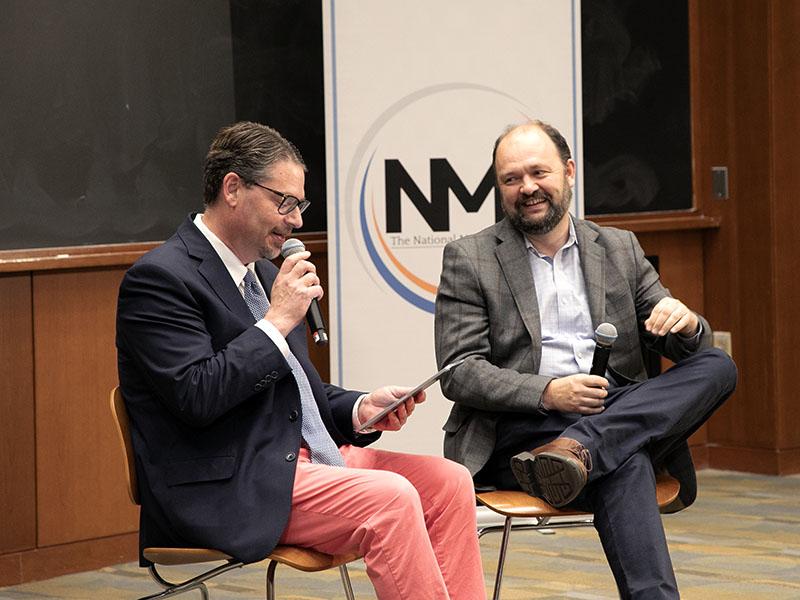Faith, Family and the Future: NYT's Ross Douthat joins UVA Conversation on Religion's Role in Modern Life

At a time when religious affiliation in the United States is declining and debates about family and culture are increasingly polarized, New York Times columnist and author Ross Douthat offered a case for faith — and its role in renewing society — to a standing-room audience in the University of Virginia’s Nau Hall.
The Oct. 7 event, hosted by UVA’s National Marriage Project, featured Douthat in conversation with the project’s director, Melville Foundation Jefferson Scholars Foundation Distinguished Professor of Sociology Brad Wilcox. The discussion centered on Douthat’s new book, Believe: Why Everyone Should Be Religious, which argues that religious belief remains a rational response to life’s mysteries.
‘Illimitable Freedom of the Human Mind’
Christa Acampora, Buckner W. Clay Professor of Philosophy and dean of the College and Graduate School of Arts & Sciences provided introductions for the discussion, tying the evening’s topic to UVA’s founding principles.
“Jefferson’s vision for the university is connected with his affirmation of what he called the illimitable freedom of the human mind,” she said. “To regard the mind as illimitable challenges us to expand our thinking, embrace curiosity, and continue to expand our understanding of human capabilities and possibilities.”
Acampora called the conversation a fitting way to commemorate the bicentennial of UVA’s first classes. “It can be tempting to avoid uncomfortable conversations or retreat into spaces where everyone agrees,” Acampora said. “But the health of a democratic society and the vitality of a great university depend on our ability to engage across differences, listen openly and generously, and wrestle genuinely with complex questions.”
A Case for Belief in the Modern World
In his conversation with Wilcox, Douthat outlined how science and cosmology point not away from, but toward, belief in a creator.
“If God exists and a religious perspective on the world is true, that reality should be available to people who aren’t philosophers or theologians,” said Douthat. “There should be a more basic and commonsensical set of evidences for God.”
Douthat argued that the universe’s order and fine-tuning support the idea of intentional design.
“The modern scientific project depends on the idea that we confront a universe that is law-bound, regular and mathematically beautiful,” he said. “That itself is a reasonable foundation for believing that there is intentionality and purpose and intelligence behind the cosmos.”
Douthat also noted the persistence of spiritual experience.
“The modern world has become less institutionally religious,” he said, “and yet religious experience not only persists, but by some measures, it’s increased as institutional religion diminishes in influence.”
To illustrate, he described witnessing a faith-healing service that profoundly changed his family’s life when he was a child — an encounter Douthat recalled as an example of how the unexplained can reshape one’s views of ordinary life.
Faith and the Renewal of Family Life
Wilcox and Douthat also explored the subject of religion’s influence on family life in an age of declining marriage and fertility.
“Family formation was once obligatory; now it’s optional,” Douthat said. “Religion really seems like the only strong force that organizes people’s lives toward the choice to court, marry and have children.”
Wilcox, whose research on marriage and family often aims to find evidence for religion’s stabilizing influence on family life, added that religious couples have maintained stronger relationships even amid cultural shifts.
“Since 2000, religiously active married couples have not seen any decline in their sexual frequency,” he said. “Religion seems to be sustaining stable, committed relationships.”
Douthat suggested that these patterns may help societies adapt to modern challenges.
“Maybe religious people, in particular, are figuring out how to form families under 21st-century conditions,” he said. “And those are the people who are going to end up having the kids and shaping the culture that comes next.”




